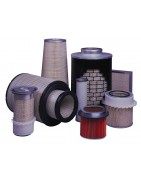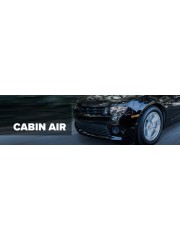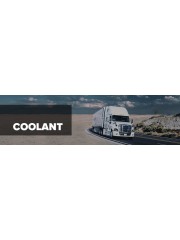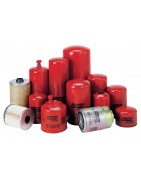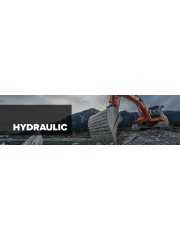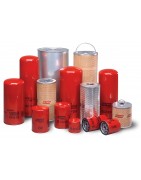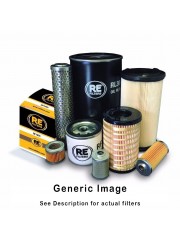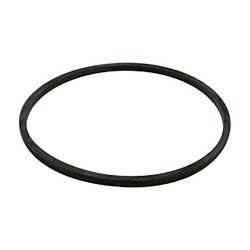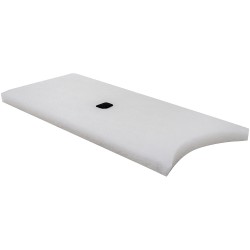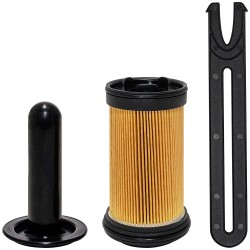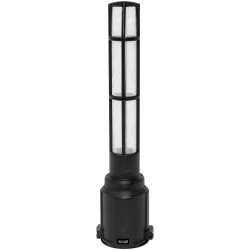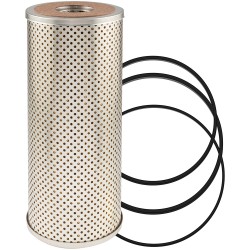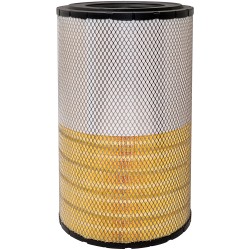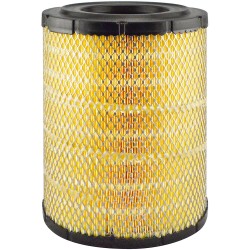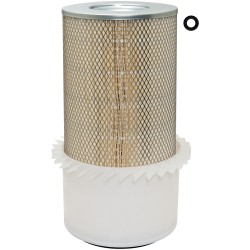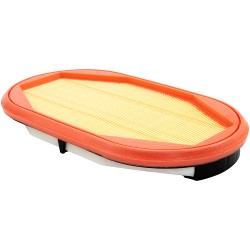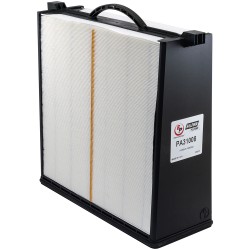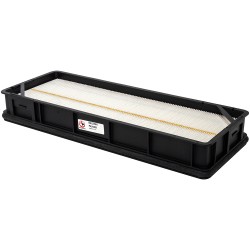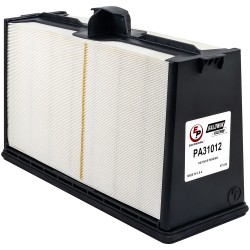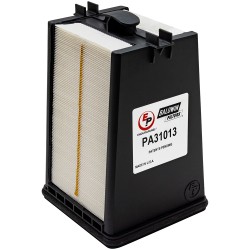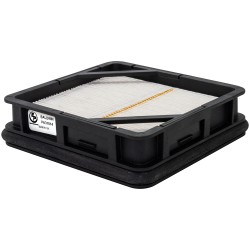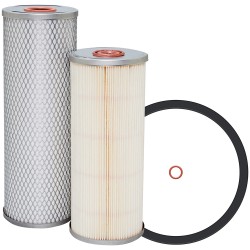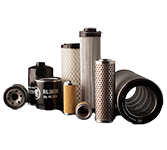
Subcategories
-
Air
CLEAN AIR CRITICAL TO PERFORMANCE
Clean air is essential to the performance and life of your engine. Proper air filtration is important because a small amount of dirt can cause a tremendous amount of engine damage.
Baldwin offers a wide range of air filters to provide the protection your engine needs. With over 2,200 air filters in our line, Baldwin filters supply the necessary protection for all types of engines.
For efficient combustion, a modern diesel engine requires several thousand times as much air as it does fuel. Under normal operating conditions, to burn one gallon (3.79 liters) of fuel you have to clean 15,000 gallons (56781 liters) of air. Add a turbocharger to that engine, and air consumption requirements increase by 20% or more.
Proper air filtration is important because a small amount of dirt can cause a tremendous amount of engine damage. The purpose of the air filter is to promote long system life by keeping damaging contaminants away from sensitive engine components.
To improve dust holding capacity and air flow, Baldwin Filters uses two proven methods to separate and stabilize the pleated media.
PermaPleat® – an embossing process that forms dividers between pleats to prevent bunching and ensure uniform air flow.
Beading – a continuous bead of adhesive around the circumference of a filter's metal wrap, either inner or outer, to lock the pleat tips in place and prevent movement. -
Cabin Air
CABIN AIR FILTERS PROVIDE ADDED PROTECTION
Cabin air filters are becoming more common in automotive and heavy-duty on- and off-highway applications.
These filters reduce the amount of airborne pollutants and particles entering the interior of a vehicle by capturing dust, pollen and other airborne contaminants.
A Baldwin cabin air filter will protect passengers from airborne pollen, bacteria, dust and smog, reduce dust and dirt accumulation in the vehicle’s interior and increase air conditioning and heat output and performance.
Baldwin cabin air filters are built to OE specifications to give you and your equipment the best protection available.
Most cabin air filters are in a location that makes it moderately easy to access and replace. Cabin air filters are typically located under the hood, or behind or under the glove compartment. The cabin air filter should be changed every year or 12,000-15,000 miles.
Baldwin automotive cabin air filters come with easy-to-use installation instructions. These step-by-step instructions tell you where to locate your cabin air filter and how to replace it. -
Coolant
PROTECT WITH COOLING SYSTEM PRODUCTS
Coolant filters protect your engine by trapping contaminants and distributing Supplemental Coolant Additives (SCAs) into your cooling system. Baldwin offers coolant filters with two SCA formulations to meet specific engine needs.
Baldwin offers coolant filters with two SCA formulations to meet specific engine needs.
Balanced Treatment for Ethylene Glycol (BTE™) is a direct replacement for DCA2 and is designed for systems operating with 30% to 60% ethylene/propylene glycol solutions.
Balanced Treatment Additive (BTA PLUS™) is a direct replacement for DCA4 and can be used in systems with antifreeze levels ranging from 0% to 60% ethylene/propylene glycol solutions.
Coolant filters are available without SCAs if the use of liquid BTE or BTA PLUS additives is preferred.
If your equipment does not currently have a coolant filter, Baldwin offers a remote-mount coolant filter base (CFB5000), which can be added to your system.
Engine by-products, liner movement, and the wear and tear of starting and stopping the engine combine to deplete SCAs. Keeping SCAs at levels necessary for protection of the cooling system requires frequent testing and a careful maintenance schedule. -
Fuel
PROTECT YOUR ENGINE FROM DIRTY FUEL
Dirty fuel is a fact of life. Even with the development of cleaner-burning fuels, contaminants are still a major concern when it comes to fuel systems.
Baldwin Filters offers more than 650 different fuel filters, fuel managers, coalescers and fuel/water separators to protect your engine.
Even with the development of cleaner-burning fuels, contaminants are still a major concern when it comes to fuel systems.
Baldwin fuel filters protect sensitive fuel system components, such as injection pumps and injectors, from damaging contaminants, which include:
Water — destroys lubricative properties of your fuel, damaging fuel system components and resulting in fuel flow stoppage at cold temperatures.
Fungus and Bacteria — plug fuel filters, feed on hydrocarbons and spread rapidly in the presence of moisture.
Precipitates (non-combustible materials) — settle out of the fuel causing few problems.
Particulates (black, tar-like contaminants) — plug fuel filters quickly.
Wax — adds energy to diesel fuel; however, during cold weather, wax thickens and gels – slowing or stopping fuel flow.
The use of a fuel filter designed for your equipment will reduce your engine’s exposure to these contaminants. -
Hydraulic
CLEAN FLUID NECESSARY TO SYSTEM LIFE
With the need for closer tolerances, faster cycle times, higher pressures and extended service intervals, more demand is being placed on the hydraulic filter.
In addition to a full line of spin-on and cartridge hydraulic filters, Baldwin Filters also offers a line of hydraulic bases and indicators.
Proper filtration starts with selecting the right filter based on the original equipment manufacturer’s recommendations, which include:- The type of fluid used.
- The system operating pressure.
- The fluid flow required for system operation.
- The restriction caused by the filter.
- The service interval expectations.
- The fluid cleanliness level required.
Improving system fluid cleanliness levels, providing better cold start performance and meeting service interval expectations are the primary objectives in the design of Baldwin hydraulic filters. To accomplish these goals, Baldwin Filters utilizes several types of filtration media:
Cellulose Media — The original and most common media is made of natural fibers. These twisted fibers are larger and more irregular than synthetic fibers — creating more resistance to flow or pressure drop.
Synthetic Media — These man-made glass fibers are very uniform in size and shape — creating the least possible resistance to flow and providing improved efficiency to protect sensitive controls.
Blended Media — A blend of cellulose and synthetic fibers provides improved efficiency, along with increased dirt-holding capacity. -
Lube
CLEAN OIL VITAL TO ENGINE PERFORMANCE
Dirty oil can cause catastrophic damage to your engine. By using the proper lube filter for your engine, you can minimize the possibility of costly downtime and repairs.
Baldwin Filters has been making lube filters for over seventy years. With more than 650 lube filters for heavy-duty and automotive applications, Baldwin has the coverage and quality you demand.Improved high-performance engines and new emission standards have had a significant impact on the development of oils and oil filters. As manufacturers continue to develop more sophisticated engines, new classifications of oils will continue to be developed.
These new oils play a vital part in protecting engines by reducing friction and wear, cooling engine parts, sealing combustion chambers, cleaning engine components and inhibiting corrosion. Lube filters also play a critical role in protecting engines by removing damaging contaminants from the oil.Lube filters trap oil contaminants in two ways:
-
Some particles adhere to the filter media as the oil flows through the filter. These particles attach themselves to the media surface without plugging the media pores.
-
Other particles are trapped in the filter media by the pressure of the oil as it flows through the filter.
-
-
Transmission Filters

